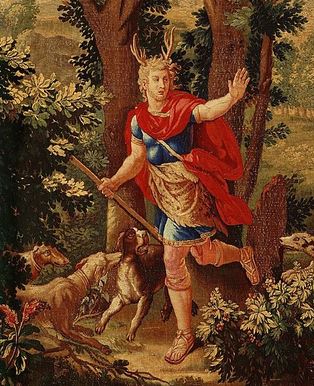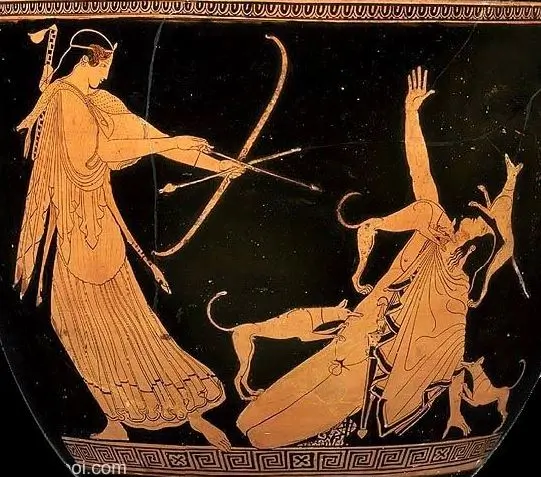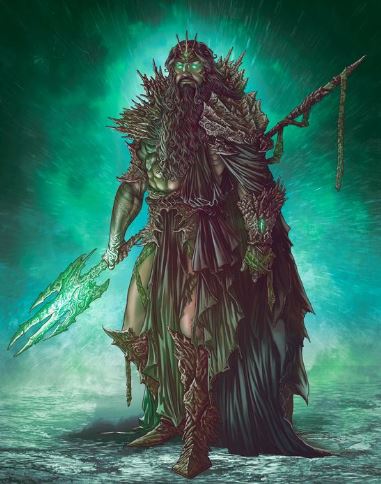Actaeon, a figure from Greek mythology, is best known for his tragic and transformative tale. The story of Actaeon has fascinated audiences for centuries, symbolizing the delicate balance between human curiosity and the divine wrath that it can provoke. This article explores the origins, myth, symbolism, and cultural impact of Actaeon’s story, providing an in-depth understanding of this complex and enduring character.
Origins and Background
Actaeon was a skilled hunter and the son of Aristaeus and Autonoë, making him the grandson of the god Apollo. He was a member of the royal family of Thebes, a city with deep mythological roots in Greek lore.
- Family Lineage: Actaeon’s father, Aristaeus, was a minor god associated with hunting, agriculture, and beekeeping. His mother, Autonoë, was the daughter of Cadmus, the founder of Thebes, and Harmonia, a goddess. This divine lineage made Actaeon a figure of considerable importance, though his tragic fate would overshadow his noble birth.
The Myth of Actaeon
The most famous myth involving Actaeon revolves around his accidental encounter with the goddess Artemis, the goddess of the hunt, the wilderness, and chastity. The myth is a cautionary tale that highlights the dangers of crossing the boundaries between mortals and the divine.
- The Fateful Encounter: One day, while hunting in the woods with his pack of dogs, Actaeon stumbled upon a secluded grove where Artemis was bathing with her nymphs. Unaware of who he had encountered, Actaeon gazed upon the goddess, an act that would seal his fate.
- Artemis’ Wrath: Enraged by the intrusion and the violation of her privacy, Artemis decided to punish Actaeon severely. She transformed him into a stag, stripping him of his human form but leaving him with his human consciousness. This transformation served as a symbol of divine retribution for a perceived transgression.
- The Tragic End: In his new form, Actaeon was unable to communicate with his hunting dogs, who no longer recognized their master. The dogs, driven by their hunting instincts, pursued and ultimately tore Actaeon apart. The hunter became the hunted, a tragic victim of circumstances beyond his control.
Symbolism and Interpretation
The story of Actaeon is rich in symbolism and has been interpreted in various ways throughout history. It serves as a powerful narrative about the consequences of curiosity, the limits of human knowledge, and the dangers of divine retribution.
- Curiosity and Transgression: Actaeon’s story can be seen as a cautionary tale about the dangers of curiosity and overstepping boundaries. His accidental gaze upon Artemis represents a transgression against the divine order, a common theme in Greek mythology.
- The Hunter Becomes the Hunted: Actaeon’s transformation into a stag and subsequent death at the hands of his own dogs symbolizes the reversal of roles and the precarious nature of human existence. It underscores the idea that those who wield power, like hunters, can also become vulnerable.
- Divine Wrath: The myth also highlights the concept of divine wrath in Greek mythology. Artemis, though a goddess associated with hunting and nature, is also fiercely protective of her chastity and privacy. Her punishment of Actaeon serves as a reminder of the consequences of offending the gods.

Cultural Impact and Legacy
The myth of Actaeon has been a source of inspiration for artists, writers, and thinkers throughout history. It has been depicted in various forms of art, literature, and even modern media, demonstrating the enduring appeal of this tragic story.
- Artistic Depictions: Actaeon’s transformation and death have been popular subjects in classical art, particularly in Renaissance and Baroque paintings. Artists like Titian and Peter Paul Rubens captured the moment of Actaeon’s discovery of Artemis or his transformation into a stag, emphasizing the drama and pathos of the myth.
- Literary References: Actaeon’s story has been referenced in numerous literary works, from ancient texts to modern poetry. It serves as a symbol of the dangers of forbidden knowledge and the tragic consequences of unintended actions.
- Modern Interpretations: In contemporary culture, the myth of Actaeon continues to be explored and reinterpreted. It resonates with themes of identity, transformation, and the human condition, making it relevant to modern audiences.Actaeon
The myth of Actaeon is a compelling and tragic tale that offers profound insights into the nature of human curiosity, the consequences of transgression, and the power of the divine. Through his story, we are reminded of the delicate balance between human ambition and the forces that govern our lives. Actaeon’s legacy endures not only as a cautionary tale but also as a reflection of the complexities of the human experience. His story continues to inspire and provoke thought, ensuring that the tragic hunter will be remembered for generations to come.



